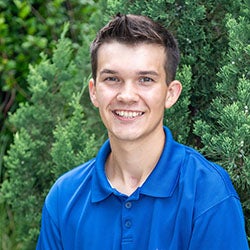Traumatic Brain Injury
Denver Buck had just turned 16 and had just gotten his driver’s license when every parent’s worst nightmare happened – he was involved in a serious traffic accident while en route to the movie theater to meet his girlfriend. “He came to a stop sign but didn’t make a complete stop,” said Denver’s mother, Jennifer Howard. “In trying to beat an 18-wheeler, he pulled out in front of a truck that hit him, sent him into the curb and flipped his car.” Denver sustained traumatic brain injuries from the impact was rushed to the nearest hospital, where he was stabilized. “The initial report said there were a total of 10 different spots on his brain, two of which were extremely concerning,” said Denver’s stepfather, Lewis Howard. “They were also in a very bad location where the spinal cord and the brain come together.” Denver was in a coma for three weeks. His family wanted him transferred to Children’s of Alabama, but because he wasn’t responding to treatment, preparations were under way to discharge him home. “We were being prepared on how to take care of him, but then a miracle happened,” Jennifer said. “The very day before he was supposed to leave, he woke up.” That miraculous moment started Denver’s care at Children’s with intensive inpatient rehabilitation, which included physical therapy, occupational therapy and speech therapy. When Denver arrived at Children’s, he couldn’t talk and he had no control over the muscles in his legs or arms. “It was amazing at Children’s because they wasted no time in getting him into therapy,” Jennifer said. “He started therapy immediately and they had him in it every single day.” Initially, doctors weren’t sure that Denver would ever relearn how to talk, walk or even feed himself again because of his extensive brain injuries. But it didn’t take long for doctors and nurses to see Denver’s determination. “I remember them telling me that they wished they saw everyone with the drive Denver had to push forward,” Jennifer said. “He had the determination to do better and overcome.” After just six weeks at Children’s, Denver was discharged home. He continued therapy in his hometown of Troy, Alabama, and he continued to progress. He returned to school, graduated, and now has a part-time job. Though once unsure if he would ever speak again, he now shares his story with other teens through trauma prevention programs. “I’m so very thankful he is able to share his story,” Jennifer said. “We’ve met so many other families whose children were in terrible accidents and they weren’t as fortunate as Denver. I’m so blessed that he’s here and that he will hopefully have a positive impact on other teens, and we have Children’s to thank for so much of that.”







